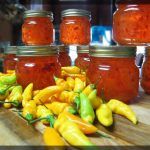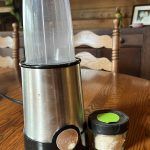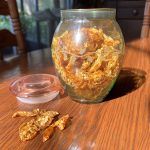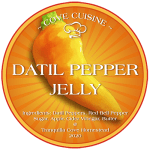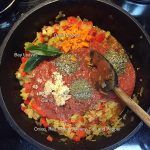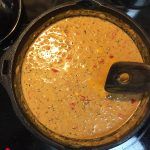Growing and Using Datil Peppers…
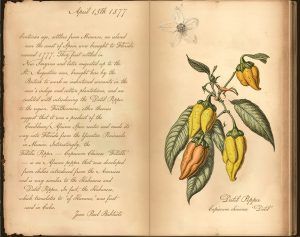
If you are a fan of spicy flavors, you’ll love growing and using Datil Peppers (Capsicum chinense ‘Datil’). These peppers are a type of hot pepper that is native to a region of North Central Florida, and they pack a punch of heat that is sure to add some excitement to your meals. Moreover, while the exact origin of the Datil Pepper is actually undocumented, the local legend around St. Augustine is that it was brought over from the Minorcans.
Centuries ago, settlers from Minorca, an island near the coast of Spain were brought to Florida around 1777. They first settled in New Smyrna and later migrated up to the St. Augustine area, brought here by the British to work as indentured servants in the area’s indigo and cotton plantations, and are credited with introducing the Datil Pepper to the region. Furthermore, other theories suggest that it was a product of the Caribbean/African Spice routes and made its way into Florida from the Yucatan Peninsula in Mexico. Interestingly, the Fatalii Pepper – Capsicum Chinese ‘Fatalli’ – is an African pepper that was developed from chilies introduced from the Americas and is very similar to the Habanero and Datil Pepper. In fact, the Habanero, which translates to ‘of Havana,’ was first used in Cuba.
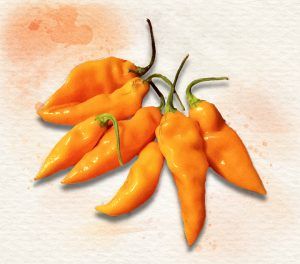
Datil Peppers are hot with a heat rating on the Scoville Scale at 100,000-300,000 units. The heat is from a compound known as capsaicin. To put this into perspective, Jalapeno peppers have a heat rating of 2,500-8,000 units, so Datil peppers are significantly hotter than Jalapenos. However, they are not quite as hot as some of the super-hot peppers like Habaneros or Ghost Peppers, which have ratings of 100,000-350,000 units and 855,000-1,041,427 units, respectively. Datil peppers have a unique flavor that is described as a blend of Habanero and Cayenne Pepper, with a slightly sweet and fruity taste. They are often used in spicy condiments and sauces, as well as in dishes like stews and chilis.
![]()
Cultivating Datil Peppers…
Being native to the St. Augustine area of Florida, Datil Peppers are well-suited to the warm, humid climate of Florida. They can be started from seeds indoors or purchased as seedlings, grown in containers, or transplanted into the garden.
Starting Datil Peppers from seed…
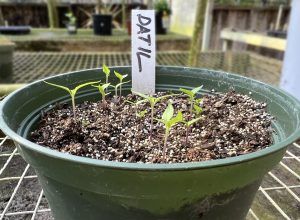
Start seeds indoors, in a greenhouse or a protected location about 8-10 weeks before the last frost date in your area. Fill a seed tray or a small pot with potting soil, and plant the seeds about ¼ inch deep. A rule of thumb to remember about sowing seeds is to plant them no deeper than the size of the seed. Water the soil lightly and cover the tray with plastic wrap to keep the soil moist or just remember to water very lightly. Keep the tray in a warm and bright location until the seeds germinate, which should take around 10-14 days. Once the seeds germinate, reduce watering. If the soil remains too moist you will risk rotting the young seedlings at the stem.
What emerges first from the germinated seed are Cotyledons, commonly known as “seed leaves” and are found in the embryo of the seed. These are not true leaves but help nourish the young seedlings before the true leaves emerge. Wait until the true leaves emerge before gently removing the seedling from the soil and transplanting it into a 4″ pot. Here it will grow and establish a good root system and be ready for transplanting into the garden or a larger pot.
Transplant seedlings…
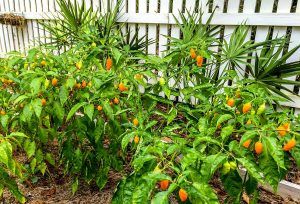
Datil peppers thrive in sunny spots with well-draining soil.
They do best when night temperatures are in the 60°’s and above. To plant, start preparing the soil by enriching it with compost, Bonemeal, Bloodmeal, and/or well-rotted manure, and space them about 18 inches apart.
Try to place the plants where they will get 6-8 hours of morning to mid-day sun and then have a bit of late afternoon shade. The plants will grow 2′ – 3′ in a season and are heavy producers, offering peppers around 2″ long. Water the plants regularly, keeping the soil moist but not soggy. Datil peppers, if given good soil and plenty of air circulation are basically carefree. They can be prone to pests, however, such as aphids and mites, so be sure to keep an eye out for these and take steps to control them if necessary. A diluted mixture of dish soap and water is often enough to deter these pests. Companion planting the peppers alongside vegetables such as tomatoes and eggplants can also help. You can also boost your plants immune system by mixing 600mg uncoated aspirin with 1 cup water mixed into a gallon of water. Spray to coat the leaves well about every couple of weeks.
![]()
Preserving Datil Peppers…
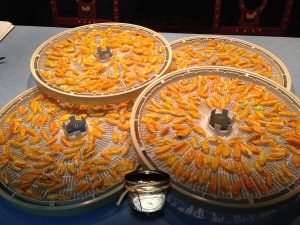
Datil peppers will take about 75-80 days to mature, at which point they will be ready to harvest. At our homestead, they are ready in July and if the weather is nice they will continue to fruit well into December! The peppers will start out green and will gradually turn orange or yellow as they mature. To harvest the peppers, simply cut them off the plant with a pair of scissors or a sharp knife. After your first harvest fertilize with the equivalent of 10-30-20 Blossom Booster and Fish Emulsion.
There are several methods for preserving Datil peppers to enjoy their flavor all year round. Drying the peppers allows them to be easily rehydrated for use in sauces and stews. Freezing the peppers in airtight containers preserves their flavor and texture for use in a variety of dishes. Pickling the peppers in vinegar and spices creates a tasty condiment to serve with sandwiches and other dishes. Proper storage of preserved peppers, such as in a cool, dry place, helps to maintain their quality.
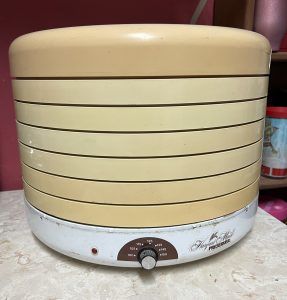
Here at Tranquilla Cove, we use our 50-year-old, Harvest Made Preserver dehydrator to completely dry the pepper and store them to grind in different recipes. For our sauce and jelly, we use either fresh or frozen. This dehydrator used to be all white! The bottom remains white because it was metal. All the levels are plastic and aged in the 50 years that I have owned it!
We dehydrate our peppers at a temperature of 125°. This low temperature allows for slow, even drying, and doesn’t cook the pepper, but simply and slowly removes the moisture, resulting in a nice crisp end result. This can take up to 12 hours.
![]()
How we use Datil Peppers in the Cove Kitchen…
Datil peppers in cooking can be used in a variety of dishes, such as sauces, soups, marinades, jellies, and rubs. When handling the peppers, it is important to use gloves to avoid irritation to the skin or eyes! There are several remedies you can try to soothe the heat on your hands and fingers after cutting hot peppers:
- Wash your hands and fingers thoroughly with soap and water. This will help remove the capsaicin, the compound that gives peppers their heat.
- Rub your hands and fingers with alcohol or vinegar. These substances can help dissolve capsaicin and remove it from your skin.
- Use milk or yogurt to help soothe the burn. The fats in milk and yogurt can help neutralize the heat from the peppers.
- Use a mixture of baking soda and water to create a paste, and apply it to your hands and fingers. Baking soda can help neutralize the heat and provide relief.
- Apply a lotion or cream containing aloe vera to your hands and fingers. Aloe vera has natural soothing properties and can help reduce burn.
- If the burn is severe or persists, consider taking an over-the-counter pain medication, such as acetaminophen or ibuprofen, to help reduce the discomfort.
Our go-to Datil recipes from Cove Cuisine…
Datil Pepper Jelly ~ Datil Pepper Jerk Marinade ~ Datil Pepper Jerk Sauce ( Sorry, my secret recipe ) ~ Minorcan Clam Chowder ~ Minorcan Hush Puppies ~ Datil Pepper Salt.
![]()
In conclusion, Datil peppers are a delicious and versatile ingredient that can be grown, preserved, and used in a variety of ways to put some Spice in your Life!
![]()




